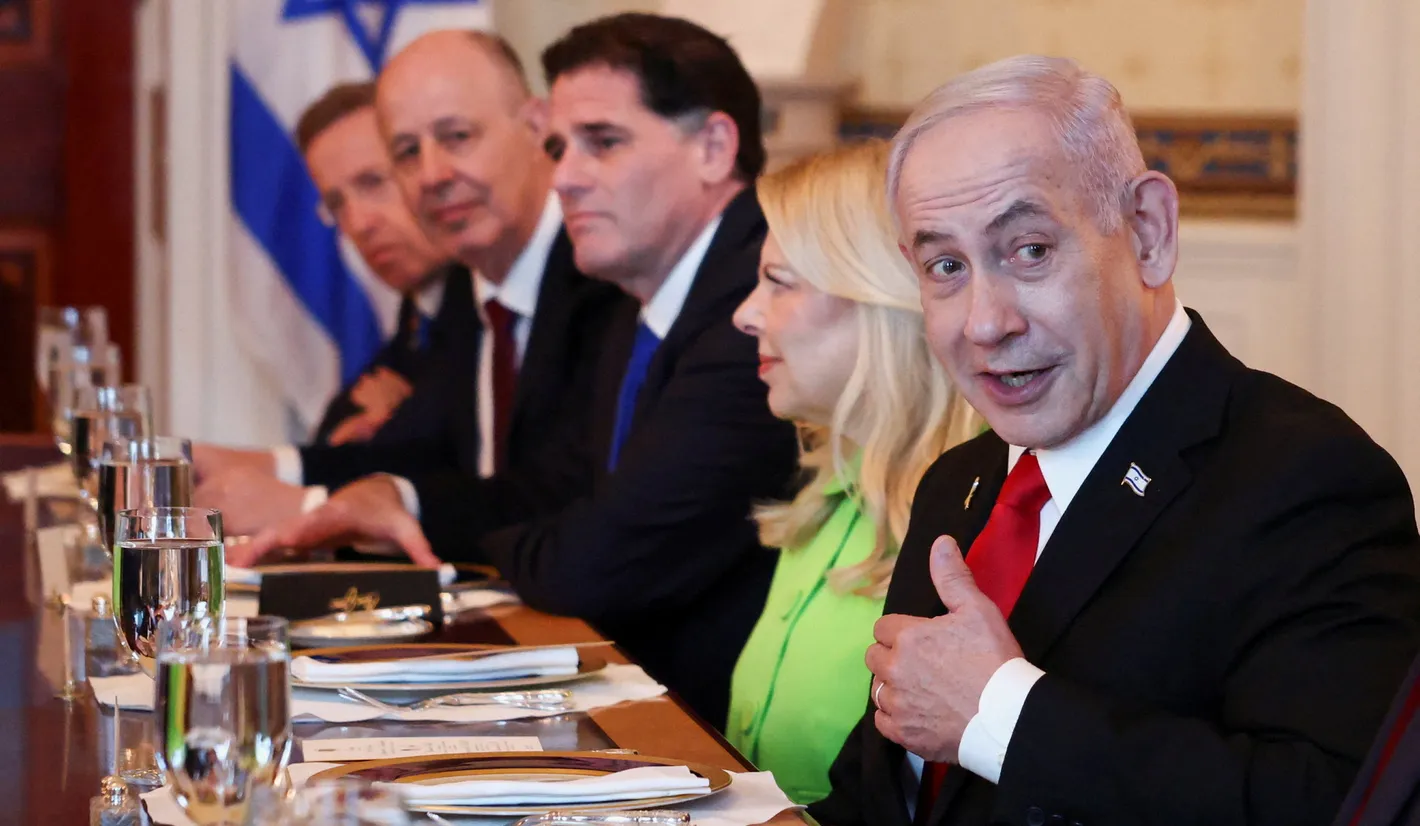While Netanyahu Dined With Trump, the Futile Gaza War Brought More Horror to Israel - Israel News - Haaretz.com

The Monday night meeting between U.S. President Donald Trump and Israeli Prime Minister Benjamin Netanyahu was preceded by media coverage that exaggerated its potential to deliver a cease-fire in Gaza. Those unrealistic expectations remained unfulfilled by Tuesday afternoon, without any real progress reported.
In a joint appearance before the cameras, Trump and Netanyahu recited their usual lines about the hostages, the negotiations with Hamas and the potential for peace in the Middle East. But there was no substance, no timeline, and no firm commitments for the near future.
As Netanyahu delivered a post-meeting briefing to Israeli journalists – sticking to his tired talking points and offering little hope of movement toward a hostage deal – the Israeli military announced that five more soldiers had been killed and several wounded fighting in northern Gaza.
The incident took place near Beit Hanoun, a Palestinian city that Israel had already conquered, destroyed, conquered again, destroyed a second time, and recently declared "cleared" from Hamas' presence.
- Netanyahu wants a Trump high-five in D.C. Israelis hope he's slapped with a Gaza truce
- Five IDF soldiers killed, 14 wounded in northern Gaza operation
- Meeting with Trump, Netanyahu endorses mass Gaza population transfer: 'It's free choice'
It's incidents like this one, and so many others happening recently, that have convinced a majority of Israelis that the war in Gaza must be brought to its end. Losing more and more young soldiers in areas of the Gaza Strip, again and again and again, seems to be a futile exercise to a growing segment of the Israeli public.
Sadly, it won't surprise anyone if a week or a month from today, we will once again wake up to news of young men dying in the same destroyed village, killed by an IED, sniper fire, a Hamas ambush or a misidentification leading to friendly fire.
From left, back row: President Donald Trump, Defense Secretary Pete Hegseth, CIA Director John Ratcliffe and U.S. Ambassador to Israel Mike Huckabee sitting across from Israeli Ambassador to the U.S. Yechiel Leiter, Israeli Prime Minister Benjamin Netanyahu, Sara Netanyahu, Israel's Strategic Affairs Minister Ron Dermer, Israel's National Security Council head Tzachi Hanegbi and Israel's Cabinet Secretary Yossi Fuchs in D.C. yesterday.Credit: Alex Brandon/AP
It should also be noted that since March, when the Netanyahu government decided to break the terms of the previous cease-fire agreement and renew the war, Israel has lost almost 40 soldiers. The reason for doing this, supposedly, was to create the right conditions for a better hostage deal than the one Netanyahu signed in January; yet so far, such a deal remains elusive.
During this four-month period, only one living hostage has come out – dual American-Israeli citizen Edan Alexander, whose release was part of a separate "side deal" between Hamas and the Trump administration.
Israelis have been counting on Trump to end this nightmare. Most Israelis believe that Netanyahu is prolonging the war for political reasons, mostly in order to keep his governing coalition from falling apart and to avoid an early election. He is dragging out the hostage negotiations, and the very fact we are negotiating for a partial agreement instead of the release of all hostages at once is a result of Netanyahu's own insistence to only accept a temporary truce with Hamas rather than a full end-of-war agreement.
Pallbearers carrying the coffin today at the funeral of Moshe Nissim Frech, an Israeli soldier killed in Gaza yesterday.Credit: Oren Ben Hakoon
Yet even this agreement – which would leave behind 10 living hostages in the hands of the terrorists at the end of its 60-day period – is still beyond reach. Netanyahu is insisting on keeping the Israeli military deep inside Gaza.
He is also wasting time in the negotiation room on the question of who will distribute humanitarian aid in Gaza – the recognized international organizations who had done so since the start of the war, or the Israeli-American venture called "The Gaza Humanitarian Foundation," which is tied to a broader plan by the Netanyahu government to concentrate Gaza's population in a narrow part of the coastal enclave, ahead of their displacement to other countries.
In the Trump-Netanyahu meeting, Israelis who are eager for the hostages to return and the war to end were hoping to see visible signs of effective American pressure being directed at Netanyahu. Instead, we once again received general statements about the importance of saving those held captive by Hamas, and not much more.
During their dinner, Netanyahu provided Trump with a meaningless but sycophantic gesture: a letter recommending him for the Nobel Peace Prize. The chances that the prize committee would take into consideration the word of Netanyahu, who is currently facing an arrest warrant for alleged war crimes, is comical.
But the truth is that Trump could actually win the much-vaunted prize if he takes the necessary steps to end the war in Gaza. Without applying pressure on Netanyahu, it will never happen.